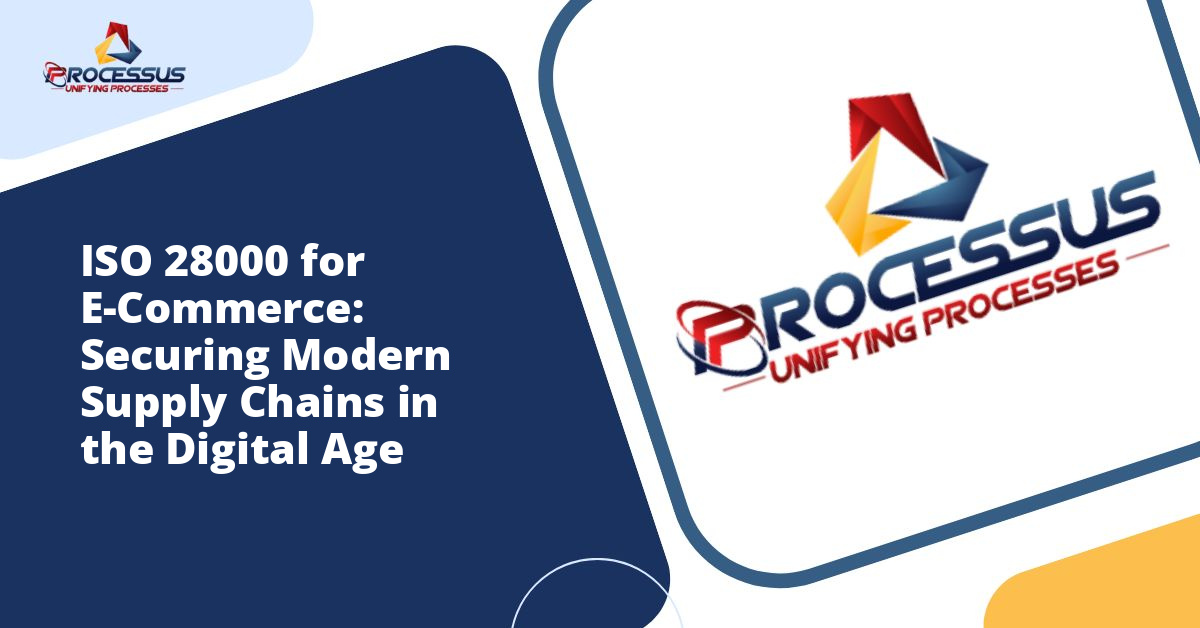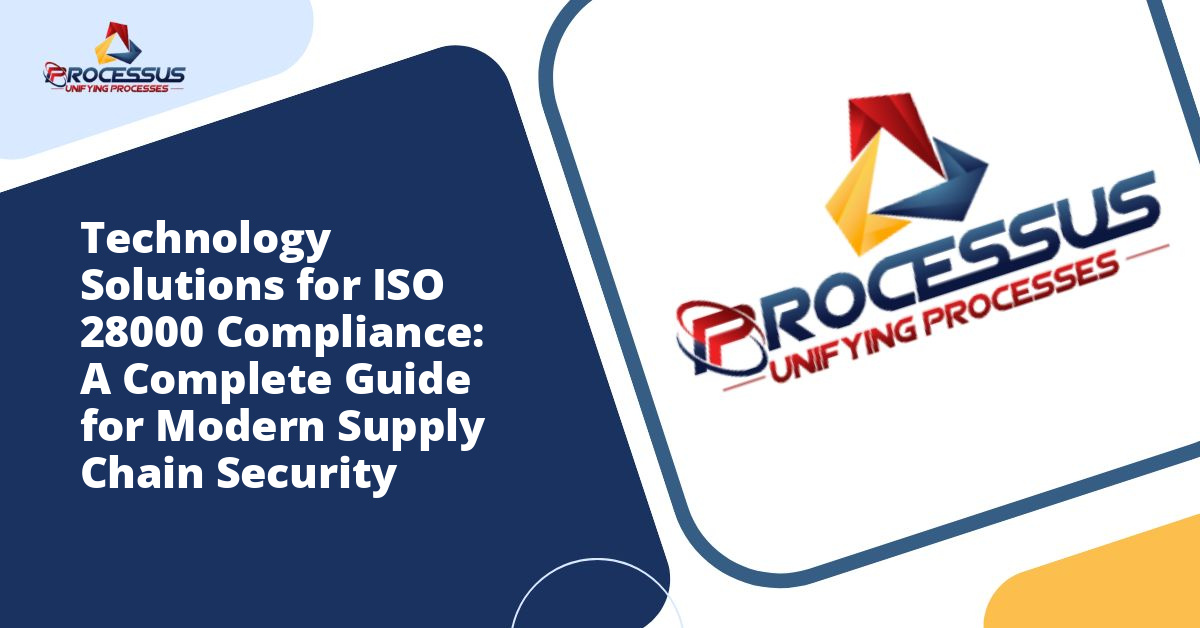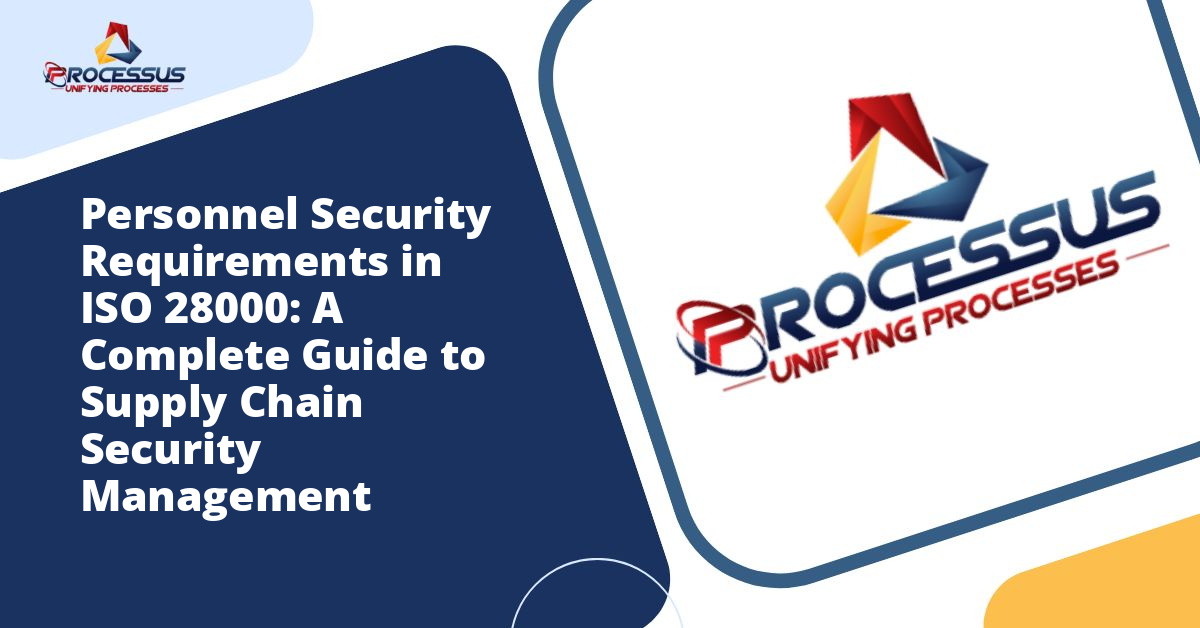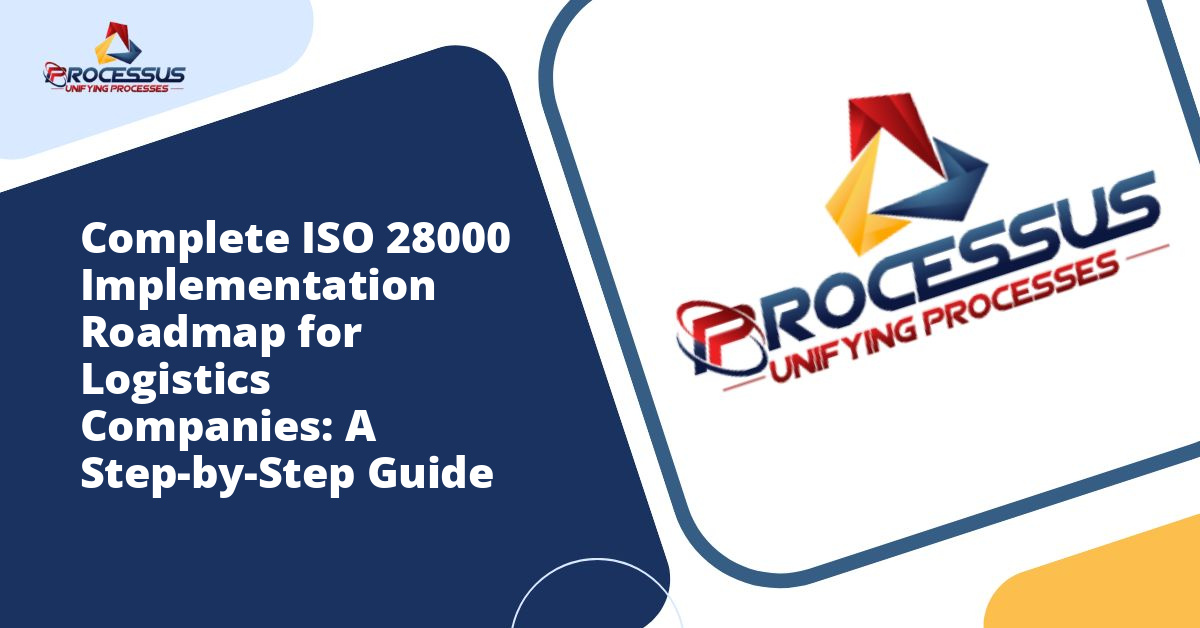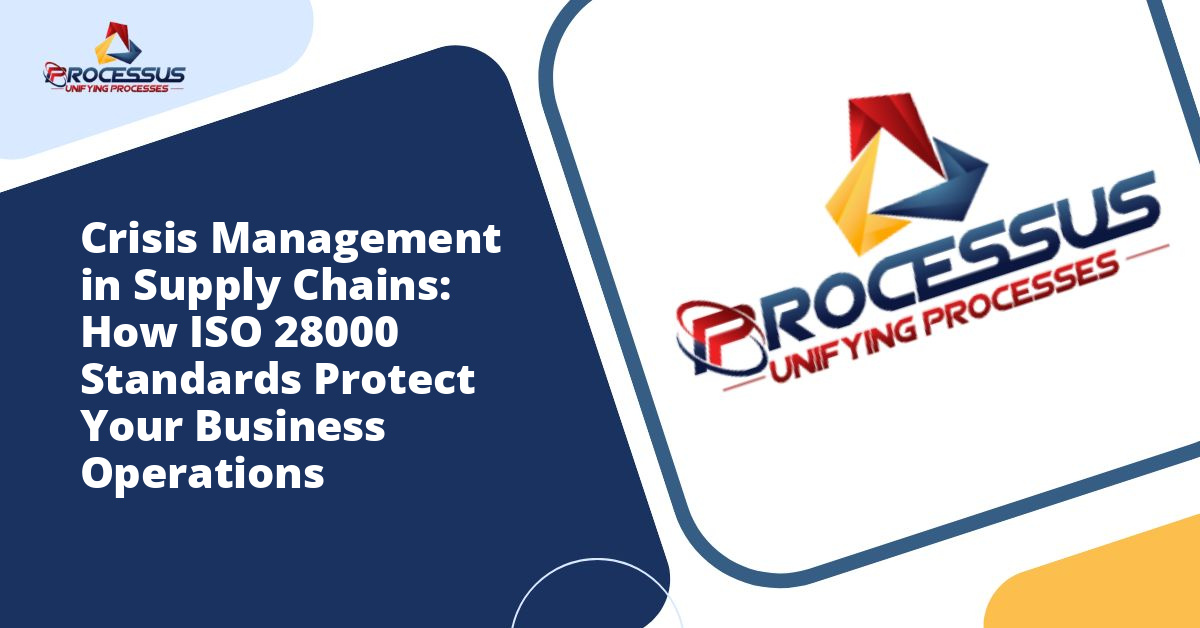The exponential growth of e-commerce has fundamentally transformed how businesses operate and deliver products to consumers worldwide. With this transformation comes an increasingly complex web of supply chain operations that span continents, involve multiple stakeholders, and handle millions of transactions daily. Securing these intricate networks has become paramount for businesses seeking to protect their operations, customers, and reputation.
ISO 28000 emerges as a critical framework designed to help organizations establish, implement, and maintain effective supply chain security management systems. For e-commerce businesses navigating the challenges of modern logistics, understanding and implementing this international standard can mean the difference between operational excellence and catastrophic security failures. You might also enjoy reading about Protecting Your Supply Chain: Why ISO 28000 Certification Matters for Modern Businesses.
Understanding ISO 28000: The Foundation of Supply Chain Security
ISO 28000 represents a comprehensive specification for security management systems designed specifically for organizations involved in any aspect of the supply chain. Developed by the International Organization for Standardization, this standard provides a framework that helps businesses identify security threats, assess risks, and implement appropriate controls throughout their supply chain operations. You might also enjoy reading about Transport Security Under ISO 28000: Best Practices for Supply Chain Protection.
The standard was created in response to growing concerns about supply chain vulnerabilities in an increasingly interconnected global economy. It addresses security management from a holistic perspective, considering physical security, information security, and personnel security as interconnected elements of a robust defense strategy. You might also enjoy reading about How ISO 28000 Helps Prevent Cargo Theft: A Comprehensive Guide to Supply Chain Security.
For e-commerce businesses, ISO 28000 offers a structured approach to managing the unique security challenges that arise from operating in digital marketplaces while relying on physical distribution networks. The standard applies to organizations of all sizes and types, from small online retailers to massive multinational e-commerce platforms.
The Growing Security Challenges in E-Commerce Supply Chains
Modern e-commerce supply chains face an unprecedented array of security threats that can disrupt operations, compromise customer data, and damage brand reputation. Understanding these challenges helps contextualize why ISO 28000 has become increasingly relevant for online businesses.
Physical Security Threats
Despite operating in digital spaces, e-commerce businesses remain vulnerable to physical security breaches. Warehouses storing inventory face risks from theft, unauthorized access, and tampering. Distribution centers handling thousands of packages daily create opportunities for product diversion, counterfeit insertion, and cargo theft. Last-mile delivery, the final step in fulfillment, presents particular vulnerabilities as packages move through multiple touchpoints before reaching customers.
Cybersecurity Vulnerabilities
E-commerce platforms generate and process enormous amounts of sensitive data, including customer personal information, payment details, and proprietary business intelligence. Cyberattacks targeting supply chain systems can result in data breaches, ransomware incidents, and system disruptions that halt operations entirely. Supply chain software, inventory management systems, and logistics tracking platforms all represent potential entry points for malicious actors.
Counterfeit and Fraud Risks
The anonymity and scale of online marketplaces create environments where counterfeit products can infiltrate legitimate supply chains. Fraudulent sellers may introduce fake goods that compromise customer safety and brand integrity. Additionally, internal fraud by employees with access to inventory or financial systems poses significant risks to e-commerce operations.
Compliance and Regulatory Pressures
E-commerce businesses operating across multiple jurisdictions must navigate complex regulatory landscapes governing data protection, customs security, and consumer safety. Non-compliance can result in substantial fines, legal liability, and operational restrictions that impact competitiveness.
Key Components of ISO 28000 for E-Commerce Operations
ISO 28000 structures security management around several core components that work together to create comprehensive protection for supply chain operations. Understanding these elements helps e-commerce businesses implement effective security frameworks.
Security Management Policy
The foundation of ISO 28000 compliance begins with establishing a clear security management policy that defines organizational commitment to supply chain security. This policy articulates security objectives, assigns responsibilities, and establishes the scope of security management activities. For e-commerce businesses, this policy must address both digital and physical aspects of operations, recognizing that security threats can emerge from multiple vectors simultaneously.
Security Risk Assessment and Planning
Systematic risk assessment forms the cornerstone of effective security management. ISO 28000 requires organizations to identify potential security threats, evaluate their likelihood and potential impact, and develop strategies to mitigate identified risks. E-commerce businesses must assess risks across their entire supply chain, from supplier selection and inventory management to fulfillment processes and customer delivery.
This assessment should consider various scenarios including natural disasters, cyber incidents, theft, terrorism, and system failures. The planning process then translates risk assessments into actionable security measures, resource allocation decisions, and contingency plans that enable rapid response to security incidents.
Implementation and Operation
Translating security policies into operational reality requires clearly defined procedures, adequate resources, and ongoing training. ISO 28000 emphasizes the importance of establishing operational controls that embed security considerations into daily business processes.
For e-commerce operations, this includes implementing access controls for warehouses and data systems, establishing verification procedures for suppliers and partners, creating secure communication channels for sensitive information, and deploying technology solutions that monitor and protect assets throughout the supply chain.
Checking and Corrective Action
Continuous monitoring ensures that security measures remain effective and adapt to evolving threats. ISO 28000 requires organizations to establish procedures for measuring security performance, conducting internal audits, and investigating security incidents. When vulnerabilities or failures are identified, corrective action processes ensure that root causes are addressed and preventive measures are implemented to avoid recurrence.
Management Review and Continuous Improvement
Leadership engagement through regular management reviews ensures that security remains a strategic priority rather than merely a compliance checkbox. These reviews evaluate the overall effectiveness of security management systems, consider changes in the threat landscape, and identify opportunities for improvement. The continuous improvement philosophy embedded in ISO 28000 ensures that security measures evolve alongside business growth and changing operational requirements.
Implementing ISO 28000 in E-Commerce Businesses
Successfully implementing ISO 28000 requires a structured approach that addresses the unique characteristics of e-commerce operations while respecting the standard’s comprehensive requirements.
Conducting a Gap Analysis
The implementation journey typically begins with a thorough gap analysis that compares current security practices against ISO 28000 requirements. This assessment identifies areas where existing controls meet the standard and highlights gaps that require attention. For many e-commerce businesses, this process reveals that while certain security measures exist, they may lack the systematic documentation, integration, and management oversight that ISO 28000 demands.
Engaging Stakeholders Across the Supply Chain
Supply chain security extends beyond the boundaries of a single organization. E-commerce businesses must engage suppliers, logistics partners, technology providers, and other stakeholders in security initiatives. ISO 28000 implementation should include establishing security requirements for partners, conducting security assessments of third-party providers, and creating collaborative mechanisms for sharing threat intelligence and responding to incidents.
Integrating Technology Solutions
Modern e-commerce supply chains rely heavily on technology for visibility, efficiency, and security. Implementing ISO 28000 often involves deploying or enhancing technology solutions such as warehouse management systems with integrated access controls, track-and-trace platforms that provide end-to-end shipment visibility, cybersecurity tools that protect data and systems from digital threats, and analytics platforms that identify anomalies indicating potential security issues.
These technology investments should align with identified security risks and support the broader security management framework rather than existing as isolated solutions.
Training and Building Security Culture
Technology and procedures alone cannot secure supply chains without human engagement. ISO 28000 implementation requires comprehensive training programs that ensure employees understand security policies, recognize potential threats, and know how to respond appropriately to security incidents. Building a security-conscious culture where every team member recognizes their role in protecting supply chain integrity amplifies the effectiveness of formal security controls.
Documentation and Record Keeping
ISO 28000 requires extensive documentation of security policies, procedures, risk assessments, and operational records. While documentation requirements may seem burdensome, they serve critical purposes including providing evidence of due diligence, enabling consistent implementation across locations and teams, facilitating training and knowledge transfer, and supporting continuous improvement through analysis of historical data.
E-commerce businesses should establish documentation systems that balance comprehensiveness with usability, ensuring that security information remains accessible and actionable rather than becoming bureaucratic overhead.
Benefits of ISO 28000 Certification for E-Commerce Businesses
Pursuing ISO 28000 certification delivers tangible benefits that extend beyond improved security to encompass operational efficiency, competitive advantage, and stakeholder confidence.
Enhanced Customer Trust and Brand Reputation
In an era where data breaches and supply chain disruptions regularly make headlines, demonstrating commitment to security through ISO 28000 certification signals to customers that their orders and personal information receive robust protection. This trust translates into customer loyalty, positive reviews, and word-of-mouth recommendations that drive business growth.
Operational Efficiency and Cost Reduction
Implementing systematic security management often reveals operational inefficiencies and redundancies. The process of mapping supply chain processes, identifying vulnerabilities, and implementing controls frequently leads to streamlined operations that reduce waste, minimize errors, and improve overall productivity. Additionally, proactive security measures prevent costly incidents such as theft, fraud, and cyber breaches that can result in direct financial losses and expensive recovery efforts.
Regulatory Compliance and Market Access
ISO 28000 certification helps e-commerce businesses demonstrate compliance with various regulatory requirements related to supply chain security, data protection, and customs programs. In some markets and industries, certification may be prerequisite for participating in certain supply chain networks or accessing particular customer segments. The standard’s international recognition facilitates cross-border operations by providing a common framework understood by regulators and business partners worldwide.
Competitive Differentiation
As supply chain security becomes increasingly important to corporate buyers and informed consumers, ISO 28000 certification provides meaningful competitive differentiation. Businesses can leverage certification in marketing materials, sales presentations, and contract negotiations to demonstrate superior operational maturity and risk management capabilities compared to non-certified competitors.
Resilience and Business Continuity
The risk assessment and contingency planning components of ISO 28000 strengthen organizational resilience against disruptions. By systematically identifying vulnerabilities and developing response plans, certified organizations recover more quickly from security incidents and maintain operations during challenging circumstances. This resilience protects revenue, preserves customer relationships, and ensures long-term business sustainability.
Challenges and Considerations in ISO 28000 Implementation
While the benefits of ISO 28000 are substantial, e-commerce businesses should approach implementation with realistic expectations about potential challenges.
Resource Requirements
Achieving certification requires significant investments of time, personnel, and financial resources. Small and medium-sized e-commerce businesses may struggle to dedicate adequate resources to implementation while maintaining daily operations. Strategic planning that phases implementation over manageable timeframes and prioritizes high-risk areas can help businesses balance security improvements with resource constraints.
Complexity of Multi-Jurisdictional Operations
E-commerce businesses operating across multiple countries face the challenge of implementing consistent security standards while accommodating varying legal requirements, cultural norms, and infrastructure capabilities. The flexibility built into ISO 28000 allows for adaptation to local contexts, but coordination across diverse operating environments requires careful planning and strong governance structures.
Balancing Security with Customer Experience
Security measures that create friction in the customer experience can negatively impact conversion rates and satisfaction. E-commerce businesses must thoughtfully design security controls that protect supply chains without introducing unnecessary complexity or delays in order fulfillment. Finding this balance requires understanding customer expectations, testing security measures before full deployment, and continuously refining controls based on feedback and performance data.
Keeping Pace with Evolving Threats
The threat landscape facing e-commerce supply chains constantly evolves as criminals develop new attack methods and vulnerabilities emerge in technologies and processes. ISO 28000 certification is not a one-time achievement but rather an ongoing commitment to security management that requires regular reassessment, updating of controls, and adaptation to new threats. Organizations must invest in threat intelligence, maintain awareness of emerging risks, and foster cultures of continuous improvement to sustain effective security over time.
The Future of Supply Chain Security in E-Commerce
As e-commerce continues expanding and supply chains grow more complex, the importance of comprehensive security frameworks like ISO 28000 will only increase. Several emerging trends will shape how online businesses approach supply chain security in coming years.
Integration of Advanced Technologies
Artificial intelligence, blockchain, Internet of Things devices, and other advanced technologies offer new capabilities for enhancing supply chain security. These technologies can provide real-time visibility, automate threat detection, verify product authenticity, and streamline compliance processes. E-commerce businesses implementing ISO 28000 will increasingly incorporate these technologies into their security management systems while also addressing new vulnerabilities that technology adoption can introduce.
Heightened Regulatory Scrutiny
Governments worldwide are implementing stricter regulations governing supply chain security, data protection, and consumer safety. E-commerce businesses should anticipate that regulatory requirements will continue expanding, making frameworks like ISO 28000 increasingly valuable for demonstrating compliance and managing regulatory risk.
Supply Chain Transparency Expectations
Consumers and corporate buyers are demanding greater transparency about supply chain practices, including security measures, ethical sourcing, and environmental impact. ISO 28000 certification provides third-party validation of security practices that can support transparency initiatives and meet stakeholder expectations for accountability.
Collaboration and Information Sharing
Effective supply chain security increasingly depends on collaboration among businesses, industry associations, and government agencies. Information sharing about threats, vulnerabilities, and best practices enables collective defense against sophisticated attacks that target supply chain ecosystems rather than individual organizations. E-commerce businesses implementing ISO 28000 should actively participate in relevant security communities and information-sharing platforms.
Taking the First Steps Toward ISO 28000 Certification
E-commerce businesses recognizing the value of ISO 28000 can begin their certification journey with several practical first steps.
Start by educating leadership and key stakeholders about the standard, its requirements, and its potential benefits. Building internal support and securing adequate resources are essential prerequisites for successful implementation. Conduct a preliminary assessment of current security practices to identify obvious gaps and quick wins that can demonstrate value early in the process.
Consider engaging external consultants with ISO 28000 expertise who can provide guidance, accelerate implementation, and help avoid common pitfalls. While external support involves additional costs, experienced consultants often save time and resources by helping organizations implement effective systems efficiently.
Establish a cross-functional implementation team that includes representatives from operations, technology, finance, legal, and other relevant departments. Supply chain security touches every aspect of e-commerce operations, and successful implementation requires diverse perspectives and coordinated action.
Develop a realistic implementation roadmap that sequences activities logically, sets achievable milestones, and allows adequate time for training, testing, and refinement. Rushing implementation to achieve quick certification often results in superficial compliance that fails to deliver meaningful security improvements.
Conclusion
ISO 28000 provides e-commerce businesses with a comprehensive, internationally recognized framework for managing supply chain security in an increasingly complex and threatening environment. While implementation requires significant commitment and resources, the benefits of enhanced security, operational efficiency, customer trust, and competitive advantage justify the investment for businesses serious about long-term success.
As supply chains continue evolving and threats become more sophisticated, systematic security management transitions from optional best practice to business imperative. E-commerce companies that proactively adopt standards like ISO 28000 position themselves to thrive in challenging environments, protect stakeholder interests, and build sustainable competitive advantages.
The journey toward ISO 28000 certification may seem daunting, but breaking implementation into manageable phases, engaging stakeholders throughout the process, and maintaining focus on continuous improvement makes the goal achievable for organizations of all sizes. By securing their supply chains today, e-commerce businesses create foundations for growth, resilience, and success in the digital economy of tomorrow.

